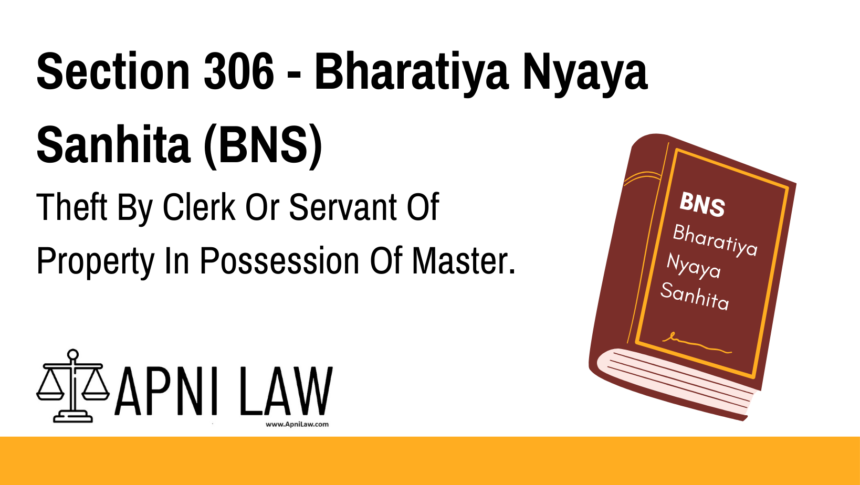Code: Section 306 BNS
Whoever, being a clerk or servant, or being employed in the capacity of a clerk or
servant, commits theft in respect of any property in the possession of his master or employer,
shall be punished with imprisonment of either description for a term which may extend to
seven years, and shall also be liable to fine.
Explanation of Section 306 BNS
Section 306 of the Bharatiya Nyaya Sanhita (BNS) specifically deals with theft committed by a clerk or servant from their master. This section aims to address breaches of trust and fiduciary responsibility within professional or personal relationships.
Key Elements of Section 306:
- Applicability:
- Applies when a clerk or servant steals property that is in the possession of their master.
- The term “master” refers to the individual or entity that employs the clerk or servant, either in a professional or personal capacity.
- Types of Offenders:
- Clerk: A person employed for administrative or office tasks.
- Servant: A person employed for domestic, personal, or other services under the supervision of a master.
- Punishment:
- Rigorous Imprisonment for up to 3 years, or
- Fine, or
- Both imprisonment and fine.
- Nature of the Offense:
- Cognizable: The police can register an FIR and investigate without prior approval.
- Bailable: Bail is a right, and the court has the discretion to grant it.
- Triable by: Magistrate’s Court.
Illustrations
Example 1: Clerk Stealing from Office Safe
- Scenario: A clerk working in a company steals money from the office safe, which belongs to the company (the master in this case).
- Application of Section 306: Since A is a clerk and has committed theft from the property in the possession of the master, this act falls under Section 306. A may be punished with up to 3 years of rigorous imprisonment, a fine, or both.
Example 2: Domestic Servant Stealing Jewelry
- Scenario: A domestic servant steals jewelry from the house of the employer.
- Application of Section 306: The servant’s act of theft from the master’s property is covered under Section 306. The court may impose imprisonment, a fine, or both.
Common Questions and Answers on Section 306 BNS
1. What is meant by “master” in Section 306?
- Answer: A master is the person or entity who employs the clerk or servant, either for professional services (like a company) or personal/domestic services (like a household employer).
2. Does this section apply to theft committed outside of work hours?
- Answer: Yes, as long as the theft involves property in the possession of the master, whether it occurs during work hours or not.
3. Is this offense bailable?
- Answer: Yes, Section 306 is a bailable offense, meaning the court has the discretion to grant bail.
4. What is the maximum punishment under Section 306?
- Answer: The offender can be punished with rigorous imprisonment up to 3 years, or a fine, or both.
5. Does the property need to be valuable for this section to apply?
- Answer: No, the section applies to any property in the possession of the master, regardless of its value.
Conclusion
Section 306 of the Bharatiya Nyaya Sanhita (BNS) addresses theft by a clerk or servant from their master, emphasizing the breach of trust that occurs in such relationships. It seeks to ensure that individuals entrusted with property in professional or personal capacities are held accountable if they abuse that trust.
The law prescribes rigorous imprisonment up to 3 years, along with the possibility of a fine, to deter such offenses. This helps maintain integrity and trust in both professional environments and domestic settings.








